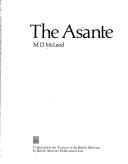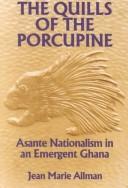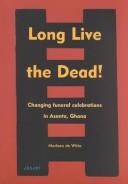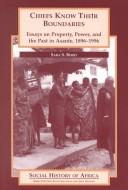| Listing 1 - 10 of 10 |
Sort by
|
Book
ISBN: 081617816X Year: 1975 Publisher: Boston Hall
Abstract | Keywords | Export | Availability | Bookmark
 Loading...
Loading...Choose an application
- Reference Manager
- EndNote
- RefWorks (Direct export to RefWorks)
Ashanti (African people) --- Bibliography. --- Achanti (African people) --- Asante (African people) --- Asanti (African people) --- Ashante Twi (African people) --- Ashantee (African people) --- Ashantis (African people) --- Akan (African people) --- Ethnology --- Bibliography --- Ashanti --- Ghana

ISBN: 1474470823 0748672737 0585443890 9780585443898 0253214963 9780253214966 0253340306 9780253340306 0748615105 9780748615100 9781474470827 9780748672738 Year: 2022 Publisher: Edinburgh
Abstract | Keywords | Export | Availability | Bookmark
 Loading...
Loading...Choose an application
- Reference Manager
- EndNote
- RefWorks (Direct export to RefWorks)
GBS_insertPreviewButtonPopup('ISBN:9780748615100);Asante Identitiesis an account of life in the Asante village of Ade beba in West Africa during a century of rapid change, told as far as possible in the words of the villagers themselves. Asante is the most intensely studied of all sub-Saharan African cultures, and this book takes Asante and African historiography to new levels of reconstruction , analysis and understanding. This is the most closely focused historical study thus far achieved of African people engaging with issues of selfhood, identity and agency in an era that saw the continent fall under European domination.Key FeaturesMajor contribution to African studies in its historical depth and analytic sophisticationA book of wider interest to non-Africanist historians, social scientists and othersConsiders issues of broad and current concern never before studied at this levelAsante Identities is a volume in the International African Library, a major monograph series from the International African Institute which complements its quarterly periodical Africa, the premier journal in the field of African Studies."
Ashanti (African people) --- Achanti (African people) --- Asante (African people) --- Asanti (African people) --- Ashante Twi (African people) --- Ashantee (African people) --- Ashantis (African people) --- Akan (African people) --- Ethnology --- History. --- Social life and customs. --- Adeeba (Ghana)

ISBN: 0714115649 0714115630 Year: 1981 Publisher: London British Museum
Abstract | Keywords | Export | Availability | Bookmark
 Loading...
Loading...Choose an application
- Reference Manager
- EndNote
- RefWorks (Direct export to RefWorks)
Ashanti (African people) --- Art, Ashanti --- Ashanti --- Achanti (Peuple d'Afrique) --- Civilization --- Social life and customs --- Achanti (African people) --- Asante (African people) --- Asanti (African people) --- Ashante Twi (African people) --- Ashantee (African people) --- Ashantis (African people) --- Akan (African people) --- Ethnology --- Ashanti (African people).

ISBN: 0585176159 9780585176154 9780299137632 0299137635 9780299137649 0299137600 0299137643 9780299137601 1282424041 9781282424043 9786612424045 6612424044 Year: 1993 Publisher: Madison, Wis.
Abstract | Keywords | Export | Availability | Bookmark
 Loading...
Loading...Choose an application
- Reference Manager
- EndNote
- RefWorks (Direct export to RefWorks)
Ashanti (African people) --- Nationalism --- Consciousness, National --- Identity, National --- National consciousness --- National identity --- International relations --- Patriotism --- Political science --- Autonomy and independence movements --- Internationalism --- Political messianism --- Achanti (African people) --- Asante (African people) --- Asanti (African people) --- Ashante Twi (African people) --- Ashantee (African people) --- Ashantis (African people) --- Akan (African people) --- Ethnology --- Politics and government. --- History --- Ashanti Region (Ghana) --- Ghana --- Ashanti (Ghana) --- Autonomy and independence movements. --- Politics and government
Book
ISBN: 0511782845 1108023304 Year: 2011 Publisher: Cambridge : Cambridge University Press,
Abstract | Keywords | Export | Availability | Bookmark
 Loading...
Loading...Choose an application
- Reference Manager
- EndNote
- RefWorks (Direct export to RefWorks)
Methodist missionary Thomas Birch Freeman (1809-1890) was one of the most successful missionaries of his day, founding churches in Nigeria and the Gold Coast. The son of an African father and English mother, he possessed great diplomatic skills in dealing with colonial administrators and native rulers, and Methodist churches spread rapidly using literate converts as lay preachers, particularly among freed and repatriated slaves. His resignation was caused by financial problems due to poor accounting. His Journal was serialised in a Methodist periodical between 1840 and 1843, published as a book in 1843, and revised the following year. His attempts to get the slave trade and the practice of human sacrifice abolished in Dahomey were frustrated, but he was much more successful in founding missions. The book is a fascinating picture of life in West Africa in the mid-nineteenth century.
Missionaries --- Methodists --- Missions --- Ghana --- Ashanti (African people) --- Social life and customs --- Freeman, Thomas Birch, --- Ashanti (Kingdom) --- History --- Achanti (African people) --- Asante (African people) --- Asanti (African people) --- Ashante Twi (African people) --- Ashantee (African people) --- Ashantis (African people) --- Akan (African people) --- Ethnology --- Christian missions --- Christianity --- Missions, Foreign --- Religion --- Theology, Practical --- Proselytizing --- Calvinistic Methodists --- Religious adherents --- Asante (Kingdom)

ISBN: 9052600031 Year: 2001 Publisher: Amsterdam Aksant
Abstract | Keywords | Export | Availability | Bookmark
 Loading...
Loading...Choose an application
- Reference Manager
- EndNote
- RefWorks (Direct export to RefWorks)
Funeral rites and ceremonies --- Ashanti (African people) --- Funérailles --- Asante (Peuple d'Afrique) --- Rites and ceremonies. --- Rites et cérémonies --- Rites et coutumes --- #GGSB: Antropologie --- #GGSB: Dood & Levenseinde --- #GGSB: Rituelen --- #SBIB:39A10 --- #SBIB:39A73 --- Funerals --- Mortuary ceremonies --- Obsequies --- Manners and customs --- Rites and ceremonies --- Burial --- Cremation --- Cryomation --- Dead --- Mourning customs --- Achanti (African people) --- Asante (African people) --- Asanti (African people) --- Ashante Twi (African people) --- Ashantee (African people) --- Ashantis (African people) --- Akan (African people) --- Ethnology --- Antropologie: religie, riten, magie, hekserij --- Etnografie: Afrika --- Antropologie --- Dood & Levenseinde --- Rituelen

ISBN: 0325070032 0325070024 0852556942 0852556446 9780325070025 9780852556443 9780325070032 9780852556948 Year: 2000 Publisher: Portsmouth, NH: Heinemann,
Abstract | Keywords | Export | Availability | Bookmark
 Loading...
Loading...Choose an application
- Reference Manager
- EndNote
- RefWorks (Direct export to RefWorks)
Ashanti (African people) --- Chiefdoms --- Kumasi (Ghana) --- Land tenure --- Agrarian tenure --- Feudal tenure --- Freehold --- Land ownership --- Land question --- Landownership --- Tenure of land --- Land use, Rural --- Real property --- Land, Nationalization of --- Landowners --- Serfdom --- Chieftaincies --- Chieftainships --- Political anthropology --- Achanti (African people) --- Asante (African people) --- Asanti (African people) --- Ashante Twi (African people) --- Ashantee (African people) --- Ashantis (African people) --- Akan (African people) --- Ethnology --- Kings and rulers --- Politics and government --- History --- Kumassi (Ghana) --- Coomassi (Ghana) --- Kumase (Ghana) --- Coomassie (Ghana) --- Politics and government. --- Social life and customs. --- Social life and customs --- Ashanti (volk). --- Gewoonterecht. --- Grondbezit. --- Lokaal bestuur. --- Stamhoofden. --- Kings and rulers. --- Land tenure. --- Ashanti (African people) - Kings and rulers --- Ashanti (African people) - Politics and government --- Ashanti (African people) - Land tenure --- Chiefdoms - Ghana - History --- Land tenure - Ghana - History --- Kumasi (Ghana) - Politics and government --- Kumasi (Ghana) - Social life and customs
Book
ISBN: 0739187864 9780739187869 9780739187852 0739187856 Year: 2015 Publisher: Lanham
Abstract | Keywords | Export | Availability | Bookmark
 Loading...
Loading...Choose an application
- Reference Manager
- EndNote
- RefWorks (Direct export to RefWorks)
This book analyzes the Asante transition to legitimate commerce in the nineteenth century and highlights the political and economic relationships of the Asante state with surrounding African groups and European traders.
Ashanti (African people) --- Slave trade --- Achanti (African people) --- Asante (African people) --- Asanti (African people) --- Ashante Twi (African people) --- Ashantee (African people) --- Ashantis (African people) --- Akan (African people) --- Ethnology --- Commerce --- History --- History. --- Ghana --- Chia-na --- Dēmokratia tēs Gkanas --- Gáana --- Gana --- Gana ka Fasojamana --- Gana Konghwaguk --- Gana Respublikaḣy --- Ganæ --- Ganah --- Ganao --- Ganmudin Orn --- Ghana Vabariik --- Ghanako Errepublika --- Ghaney --- Ghanská republika --- Gkana --- Government of Ghana --- Gweriniaeth Ghana --- Hana (Ghana) --- IGana --- Ochíchìíwú Ghana --- Pobblaght ny Ganey --- Poblachd Ghàna --- Poblacht Ghána --- Qana --- Qana Respublikası --- Repubblica del Ghana --- Republic of Ghana --- República de Ghana --- Rèpublica du Gana --- Republik Ghana --- Republika Gana --- Republiḳat Ganah --- République du Ghana --- Rėspublika Hana --- Respublikæ Ganæ --- Tjóðveldið Gana --- Yn Ghaney --- Γκάνα --- Δημοκρατία της Γκάνας --- Рэспубліка Гана --- Республикæ Ганæ --- Република Гана --- Ганæ --- Гана --- Ганмудин Орн --- רפובליקת גאנה --- גאנה --- ガーナ --- 가나 --- 가나 공화국 --- Ashanti --- Gold Coast --- Northern Territories of the Gold Coast --- Togoland (British) --- Economic conditions --- Relations
Book
ISBN: 9522227692 9522227935 9522226823 9789522227935 9789522227690 9789522227930 Year: 2016 Publisher: Helsinki : Finnish Literature Society / SKS,
Abstract | Keywords | Export | Availability | Bookmark
 Loading...
Loading...Choose an application
- Reference Manager
- EndNote
- RefWorks (Direct export to RefWorks)
The divine kingship and chiefship of the Asante people of central Ghana have been undergoing a shift towards secularization since the start of the colonial era. Timo Kallinen maintains that a close examination of this transformation provides us with a better understanding of secularization processes in Ghana more broadly, and in other post-colonial societies whose historical development likewise differs from that of the modern West, and which have largely confronted secular modernity through encounters with European colonialism. Throughout the volume secularization is understood as a process in modern society whereby divinity is separated from the ways in which both human society is regulated and physical nature is understood to function. Divine Rulers in a Secular State has been divided into three thematic parts, each with a short theoretical introduction. In the first two, analysis is primarily inspired by the work of Louis Dumont, while in the third the theoretical ideas of Webb Keane and Bruno Latour are of central importance. The undifferentiated order of the pre-colonial Asante kingdom, in which the chiefly and priestly functions of the rulers were not separated, comprises the initial focus. Sacrifices and marriage exchanges, both of which were directed at establishing and perpetuating relations between the living and the spirits of the dead ancestors, are posited as the most important responsibilities of the chief. Also explored are perceptions that the founding of the kingdom and its authority structure are the results of sacrifices offered to various gods by the Asante king and his chiefs. The second part examines the dissolution of the traditional order since the onset of British colonial occupation. The secularization process was initiated by the aspirations of colonial administrators and missionary bodies who aimed to maintain Christian converts under the ‘political’ authority of their non-Christian chiefs, who were still important ritual leaders. Consequently, it was necessary to start dividing society along ‘political’ and ‘religious’ lines so that only the former was a mandatory concern for all. The kernel of modern citizenship was planted at the same time as the ‘religious’ conscience of individuals started to shape their rights and duties towards their ‘political’ rulers. Furthermore, theories about Asante as a state based on contract and representation were proposed and developed. In the post-colonial era chiefship has been put into the service of the independent nation state - both as an instrument of administration and a nationalistic symbol, while, most recently, chiefs have been depicted as leaders in civil society, even receiving support from global developmental organizations. Yet traditional chieftaincy is strongly criticized by certain Christian groups belonging to the Pentecostal-Charismatic movement, which still see it as integrally linked to traditional cosmologies. The third part of the book takes the discussion beyond the separation of the categories of religion and politics. Secularization has also has also entailed the dematerialization of religion, establishing it as something that ought to be understood primarily as mental or spiritual; in a secular society 'things' like deities, witchcraft, or sacrifices should not be recognized as proper agents and actions at the level of immanent relations. In Ghana such views are effectively contradicted by religious groups which see spiritual forces as the most powerful agents in social relations. The cases discussed deal with attempted state control of anti-witchcraft activities, the efficiency of protective magic during political upheavals, and Pentecostal notions of demonic influences in secular politics. The Conclusions section brings the themes of the book together by discussing the large-scale effects of the secular project in contemporary Ghanaian society. Research is based on anthropological fieldwork conducted in Ghana in 2000-2001 and 2005-2006, data drawn from several archival sources located in Ghana and the United Kingdom, and the anthropological and historical literature on Ghana and the Asante.
Ashanti (African people) --- Ethnology --- Ethnohistory --- Secularism. --- History --- Kings and rulers --- Ghana --- Ashanti (Kingdom) --- Kings and rulers. --- Colonial influence. --- Ethnohistorical method --- Historical anthropology --- Historical ethnology --- Anthropology --- Achanti (African people) --- Asante (African people) --- Asanti (African people) --- Ashante Twi (African people) --- Ashantee (African people) --- Ashantis (African people) --- Akan (African people) --- Ethics --- Irreligion --- Utilitarianism --- Atheism --- Postsecularism --- Secularization (Theology) --- Methodology --- Asante (Kingdom) --- Chia-na --- Gana --- Republic of Ghana --- Ganah --- Government of Ghana --- Rèpublica du Gana --- Qana --- Qana Respublikası --- Gana ka Fasojamana --- Republik Ghana --- Гана --- Gana Respublikaḣy --- Hana (Ghana) --- Рэспубліка Гана --- Rėspublika Hana --- Република Гана --- Republika Gana --- Ghanská republika --- Gweriniaeth Ghana --- Gáana --- Ghana Vabariik --- Γκάνα --- Gkana --- Δημοκρατία της Γκάνας --- Dēmokratia tēs Gkanas --- República de Ghana --- Ganao --- Ghanako Errepublika --- Tjóðveldið Gana --- République du Ghana --- Poblacht Ghána --- Yn Ghaney --- Ghaney --- Pobblaght ny Ganey --- Poblachd Ghàna --- Ганмудин Орн --- Ganmudin Orn --- 가나 --- 가나 공화국 --- Gana Konghwaguk --- Ochíchìíwú Ghana --- Ганæ --- Ganæ --- Республикæ Ганæ --- Respublikæ Ganæ --- IGana --- Repubblica del Ghana --- גאנה --- רפובליקת גאנה --- Republiḳat Ganah --- ガーナ --- Togoland (British) --- Gold Coast --- Ashanti --- Northern Territories of the Gold Coast
Book
ISBN: 9781580463911 1580464785 9781580464789 1782045724 1580467393 9781580467391 1580463916 Year: 2011 Publisher: Rochester, NY University of Rochester Press
Abstract | Keywords | Export | Availability | Bookmark
 Loading...
Loading...Choose an application
- Reference Manager
- EndNote
- RefWorks (Direct export to RefWorks)
The history of Ghana attracts popular interest out of proportion to its small size and marginal importance to the global economy. Ghana is the land of Kwame Nkrumah and the Pan-Africanist movement of the 1960s; it has been a temporary home to famous African Americans like W. E. B. DuBois and Maya Angelou; and its Asante Kingdom and signature kente cloth-global symbols of African culture and pride-are well known. Ghana also attracts a continuous flow of international tourists because of two historical sites that are among the most notorious monuments of the transatlantic slave trade: Cape Coast and Elmina Castles. These looming structures are a vivid reminder of the horrific trade that gave birth to the black population of the Americas. The Fante and the Transatlantic Slave Trade/ explores the fascinating history of the transatlantic slave trade on Ghana's coast between 1700 and 1807. Here author Rebecca Shumway brings to life the survival experiences of southern Ghanaians as they became both victims of continuous violence and successful brokers of enslaved human beings. The era of the slave trade gave birth to a new culture in this part of West Africa, just as it was giving birth to new cultures across the Americas. The Fante and the Transatlantic Slave Trade pushes Asante scholarship to the forefront of African diaspora and Atlantic World studies by showing the integral role of Fante middlemen and transatlantic trade in the development of the Asante economy prior to 1807.
Slave trade --- Fanti (African people) --- History --- Ashanti (Kingdom) --- #SBIB:39A4 --- #SBIB:39A73 --- #SBIB:96G --- Fante (African people) --- Fantis --- Mfantse (African people) --- Ethnology --- Akan (African people) --- Toegepaste antropologie --- Etnografie: Afrika --- Geschiedenis van Afrika --- Asante (Kingdom) --- Slave trade. --- Ashanti (African people) --- Ghana. --- Achanti (African people) --- Asante (African people) --- Asanti (African people) --- Ashante Twi (African people) --- Ashantee (African people) --- Ashantis (African people) --- Chia-na --- D�emokratia t�es Gkanas --- G�aana --- Gana --- Gana ka Fasojamana --- Gana Konghwaguk --- Gana Respublika�hy --- Gan� --- Ganah --- Ganao --- Ganmudin Orn --- Ghana --- Ghana Vabariik --- Ghanako Errepublika --- Ghaney --- Ghansk�a republika --- Gkana --- Gold Coast --- Government of Ghana --- Gweriniaeth Ghana --- IGana --- Och�ich�i�iw�u Ghana --- Pobblaght ny Ganey --- Poblachd Gh�ana --- Poblacht Gh�ana --- Qana --- Qana Respublikas� --- Repubblica del Ghana --- Republic of Ghana --- Rep�ublica de Ghana --- R�epublica du Gana --- Republik Ghana --- Republika Gana --- Republi�kat Ganah --- R�epublique du Ghana --- R�espublika Hana --- Respublik� Gan� --- Tj�o�veldi� Gana --- Yn Ghaney --- Africa --- Dēmokratia tēs Gkanas --- Gáana --- Gana Respublikaḣy --- Ganæ --- Ghanská republika --- Ochíchìíwú Ghana --- Poblachd Ghàna --- Poblacht Ghána --- Qana Respublikası --- República de Ghana --- Rèpublica du Gana --- Republiḳat Ganah --- République du Ghana --- Rėspublika Hana --- Respublikæ Ganæ --- Tjóðveldið Gana --- Homegoing. --- Yaa Gyasi.
| Listing 1 - 10 of 10 |
Sort by
|

 Search
Search Feedback
Feedback About UniCat
About UniCat  Help
Help News
News